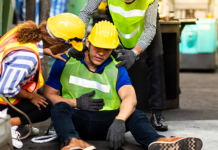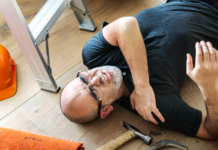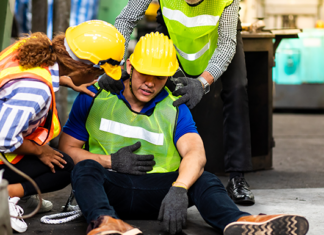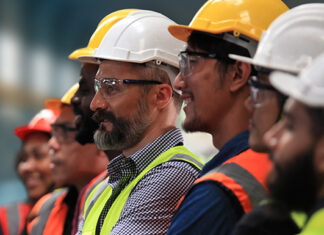The use of slip-resistant footwear is a common response to slippery conditions in the workplace. Let’s review the general effectiveness of this type of footwear, and how to enhance an employer’s risk reduction effort.
What is a slip-resistant shoe?
Every step we take requires a minimum amount of friction between the flooring surface and shoe sole. When the horizontal force behind our step is enough to overcome the provided friction, a slip occurs. Slip-resistant shoes are specially designed to reduce the risk of a slip by providing a higher level of friction than typical footwear.
Effectiveness is based upon an open tread design and a soft rubber sole material. The open tread gives liquid somewhere to go and channels it out from under the shoe to make hydroplaning less likely. The softer rubber sole material is more flexible and provides a better “grip” on floor surfaces. A study of 475 fast-food restaurant workers found that the mean self-reported rate of slipping was 54% lower for those wearing slip-resistant footwear.
Give employees a list of preferred shoes
Currently, no minimum requirements are regulating at what point a manufacturer can market a shoe as slip-resistant. A look at the testing results from a manufacturer showed that the performance among models varied considerably. When measured on wet, oily quarry tile, the coefficients of friction of shoes marketed as slip-resistant ranged from .41 to .76. Another restaurant study found that for each .1 decrease in the coefficient of friction, the rate of slipping increased by 21%. This is a strong case for employers to research their vendors and establish a preferred models list. Many vendors will provide testing results upon request.
Wear, replace, repeat…
The effectiveness of slip-resistant footwear not only varies among models but degrades with use. A 2014 study of fast-food workers found that there was no statistically significant difference in the self-reported rate of slipping between workers who wore slip-resistant shoes with at least 6 months of wear and those who wore shoes not marketed as slip resistant. The workers who replaced their worn slip-resistant shoes experienced an average reduction in slip rate of 55%. Any employer requiring the use of slip-resistant footwear will benefit from establishing replacement guidelines.
How to guide your employees
To maximize the reduction in risk that slip-resistant shoes can provide, employers should implement a formal written program. It should include guidelines for shoe selection, purchase, reimbursement and replacement. Careful consideration should be given to:
- Selecting a vendor
- Establishing a list of preferred models
- Determining whether workers will be reimbursed
- Developing a minimum standard for shoe replacement

















